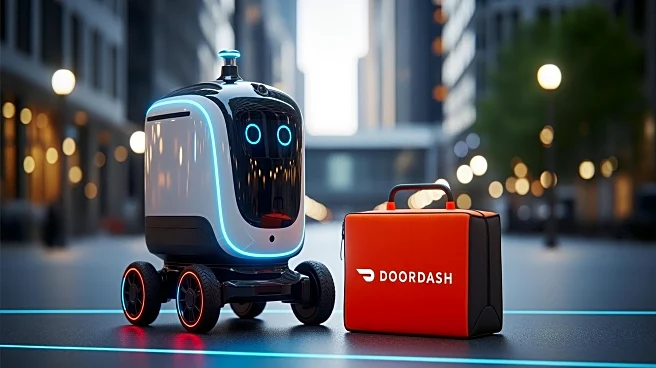What's Happening?
Serve Robotics, an autonomous delivery company, has announced a new partnership with DoorDash to expand its delivery services using robots. The collaboration will initially focus on Los Angeles, where
Serve already operates with Uber Eats, and aims to extend across the United States. Serve Robotics, which originated from Uber-owned Postmates in 2021, currently operates in five cities: Atlanta, Chicago, Dallas, Los Angeles, and Miami. The company's CEO, Ali Kashani, emphasized the potential of delivery robots over robotaxis, suggesting that the delivery market could be larger due to the high volume of items consumed daily. Serve Robotics aims to become a shared platform, allowing various businesses to utilize its infrastructure for deliveries.
Why It's Important?
The partnership between Serve Robotics and DoorDash signifies a growing trend in the use of autonomous technology for delivery services, which could revolutionize the logistics industry. By leveraging robots for deliveries, companies can potentially reduce costs and increase efficiency, impacting the broader economy and consumer habits. The collaboration also highlights the competitive landscape in autonomous delivery, with companies like DoorDash and Uber Eats investing in robotic solutions. This development could lead to increased adoption of autonomous delivery vehicles, influencing urban planning and transportation policies.
What's Next?
Serve Robotics plans to expand its partnership with DoorDash across the U.S., potentially increasing the presence of delivery robots in urban areas. As the technology becomes more widespread, stakeholders such as local governments and businesses may need to address regulatory and infrastructure challenges associated with autonomous delivery. The success of this partnership could encourage other companies to explore similar collaborations, further integrating autonomous technology into everyday logistics.
Beyond the Headlines
The rise of autonomous delivery robots raises ethical and legal questions regarding employment, as these technologies could impact jobs traditionally held by human delivery drivers. Additionally, the increased use of robots in public spaces may necessitate discussions on privacy and safety standards. Long-term, the integration of autonomous delivery could influence cultural perceptions of technology and automation in daily life.










